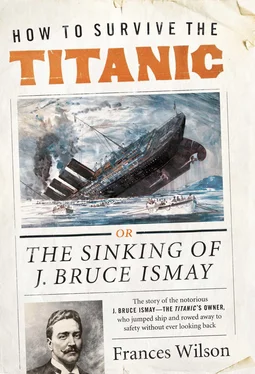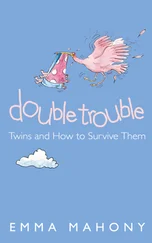By the time of Ismay’s death, the Titanic was no longer the most horrific event of the twentieth century and the crisis of one man’s loss of honour had, for the moment, been forgotten. The tone of his obituaries was gentle, forgiving; the London Evening News said that although ‘the Titanic episode was written on his heart, it will not be his epigraph’. The New York Times stated that he had been a ‘passenger’ on the ship and had died ‘without making any further public statement on the Titanic or his conduct than that which he told the Senate Committee and Lord Mersey’s Board of Trade investigations’. The Journal of Commerce remarked that he was ‘one of the greatest captains of the shipping industry… having once reached a decision [he was] absolutely immovable’, added to which he possessed ‘an extraordinary memory’. On the ‘personal side’, however, ‘Mr Bruce Ismay was, to most people, an enigma’. In America, the New York Tribune noted of Ismay’s life that ‘the parallel with the tale of Conrad’s Lord Jim will occur to most of us’. The parallel had occurred to no one, and if it had ever occurred to Conrad — as it must have done — he did not say so. Conrad turned his face away from the human side of the Titanic. He knew what ships did to men, he had written enough about the codes of fidelity and community on which both he and Ismay had been raised. Nor would he have considered the mirroring of Jim’s and Ismay’s stories such an extraordinary coincidence. Nothing about the sea surprised Conrad: so long as there are ships to sink, men will jump from them.
‘Jim’s desertion of his ship’, the New York Tribune ’s obituary of Ismay continued, ‘was, to be sure, in direct violation of his duty… but it too had its explanation that men accepted. The point is that with a sensitive soul the explanation, however convincing, is overshadowed by the necessity to explain, and from that there seems to be no release short of the grave.’ Ismay felt the necessity to excuse rather than explain himself and while Jim, too, makes excuses — ‘I told you I jumped; but I tell you they were too much for any man. It was their doing as plainly as if they had reached up with a boathook and pulled me over’ — he is also compelled, as Ismay was not, by the desire to understand his actions, or at least for others to understand them. Ismay had no knowledge of the release that comes from elucidation, and only the slightest idea — from his brief communication with Mrs Thayer — of the healing power of empathy. He was happy to appear as a man without moral content because, unlike Jim, he had not dreamed of becoming a hero. Ismay had never thought so much of himself.
According to Wilton Oldham in The Ismay Line, the only time Ismay ever spoke of his departure from the ship was in a conversation with his sister-in-law, Constance, who was the sister of Bruce’s wife as well as the wife of his brother. Described by her great-niece as a ‘bookworm, animal-lover, traveller, rebel, and in her old age [a] dispenser of wisdom’, 8Constance, who thought Florence’s moratorium on talking about the Titanic a mistake, was another of Ismay’s secret sharers. The reason, he revealed to her, that he had jumped was not because the boat was there and the deck was empty, but because he been ordered to do so by Chief Officer Wilde, who said that Ismay’s evidence would be needed at the subsequent inquiry. Ismay left the ship knowing that the purpose of his survival was to represent the Captain, the crew and the company, to be the witness of the night, to contain, explain and make sense of it all to the bewildered world. In exchange for his continued life, he must carry into the history books the story of the Titanic. Why did he keep this a secret? Both Albert Weikman, the Titanic ’s barber, and Lightoller had told Senator Smith that Ismay had been thrown into the lifeboat by Wilde, but Ismay had always denied that this was the case. After hearing Lightoller’s defence of Ismay in Washington, Lawrence Beesley wrote in the New York Times on 29 April 1912 that ‘bundling Ismay into a boat… seems a very natural act for an officer of the line to perform toward the head of the line’. Endorsing, in his conversation with Constance, this version of events, Ismay now suggested that the great burden of his life was not that he had jumped from a sinking ship teeming with lives, but that he made a Faustian pact which he then failed to keep. Ismay decided, as he sat in the lifeboat, that he would rather be cast as a coward than drag behind him the ball and chain of the narrative. His life had been granted in order that he face the inquiry, but it was Lightoller instead who took on this role and played it for all it was worth.
Fidelity to the notion of honour was a concept that would dominate the lives of Ismay’s two sons-in-law. Brigadier General Ronald Cheape, the husband of Ismay’s eldest daughter, Margaret, was a soldier possessed, as Pauline Matarasso puts it, more of ‘bone-headed courage than tactical brilliance’. Cheape, known as ‘the General’, refused to speak to one of his sons — named Bruce — who had spent four years in Germany as a prisoner of war because, as far as he was concerned, the young man was a ‘hands-upper’. Never happier than during a war, the General lived like a Viking on his Scottish estate and expected his guests to do so too; even lavatory paper — which the Picts had done without — was considered by him effeminate. He was, in the words of one of his nephews, ‘the last of the Titans’. According to Ronald Cheape’s obituarist, ‘There are many people with physical courage, fewer with moral courage. General Cheape’s outstanding characteristic was the combination of both in the highest degree.’
Basil Sanderson, the husband of Evelyn, was more refined in his understanding of courage. Having fought on the Somme and won an MC, Basil wrote in an army notebook an essay containing his thoughts on ‘Fear’. ‘There is no such thing as courage,’ he begins, ‘at least in the way most people understand the word.’ Many men overcome fear not because they are brave but because they have an even greater fear of scorn. Because he was ‘born a coward’ in a culture of heroes and hero-worship, young Basil spent his boyhood preparing to defend himself against the sudden emergence of fear, jumping into the deep end of swimming pools because he was afraid of water, taking up boxing so that people would think he was brave, banging at the door to enlist in I9I4 because ‘the one thing that has always petrified me is the thought of war’. These, he says, are signs not of courage but of ‘moral cowardice’, which is a condition that arises in a man when ‘fear of the opinion of the rest of mankind is more terrible than that awful dread which is gnawing at him inside’. Moral cowardice was the reason that Basil Sanderson ‘went down into the biggest and longest battle there has ever been and stayed in the line at my own request throughout the whole of it. I was terrified to think that people might suspect I was afraid… And oh, the fights and battles which I used to have within myself!’ 9It is impossible to read these pages without thinking of Ismay, the closest friend of Basil Sanderson’s father, who had thought himself impervious to fear until it reared its hydra head.
‘Why’, Marlow wondered of his interest in Jim, ‘I longed to go grubbing into the deplorable details of an occurrence which, after all, concerned me no more than as a member of an obscure body of men held together by… fidelity to a certain standard of conduct, I can’t explain. You may call it unhealthy curiosity if you like; but I have a distinct notion I wished to find something.’ Would Marlow have found anything in the deplorable details of Ismay’s story? The tragedy for Ismay was not that his ship hit an iceberg, but that he was unable, as Conrad puts it, to find ‘fit words for his meaning’. Rather than confide in a discreet, understanding man with an interest in extracting the ‘felt, subjective experience behind the objective, outward facts’, Ismay watched as his story was constructed from a collage of contradictory witness reports, hasty journalistic reactions and a drama staged by Senator William Alden Smith. Without the presence of a Marlow, the chaos of the night, the horror of it all, remained for Ismay chaos and horror, an experience too great to absorb. Had Marlow been at either of the inquiries into the Titanic, he would have known immediately, instinctively, of what Ismay was made. And had he then taken Ismay off to some quiet corner of New York’s Waldorf-Astoria or Willard’s Hotel in Washington and listened to him circle his story — I got in as she was being lowered away… Because there was room in the boat… She was being lowered away… I felt the ship was going down and I got into the boat… I did not get into the boat until after they had begun to lower it away… My back was turned to her… I did not wish to see her go down — he would have experienced one of his moments of awakening, ‘when we see, hear, understand, ever so much — everything — in a flash’, and when he sees a person ‘as though I had never seen him before’.
Читать дальше












